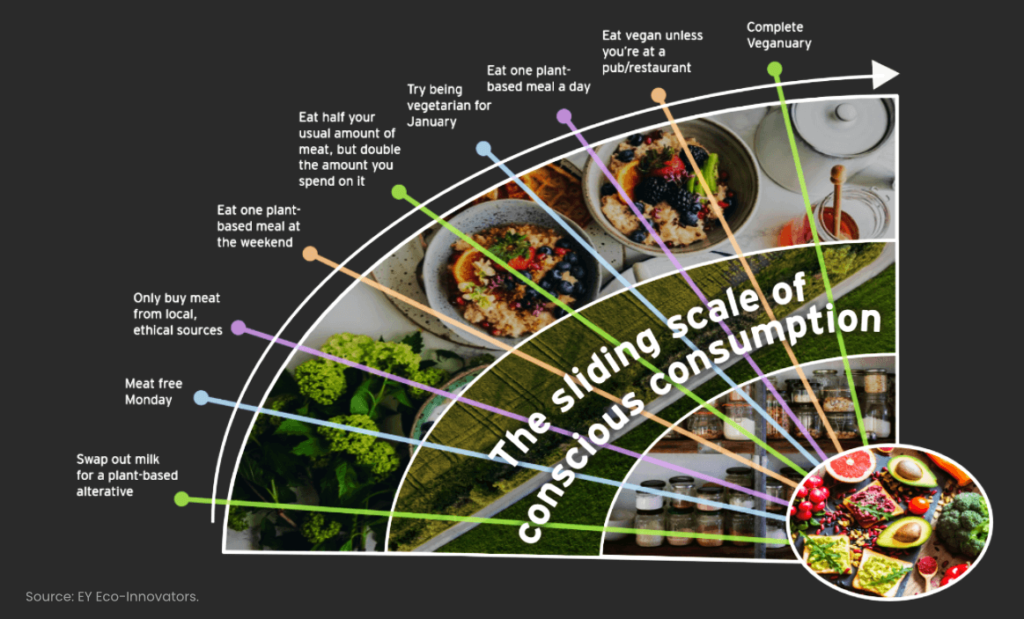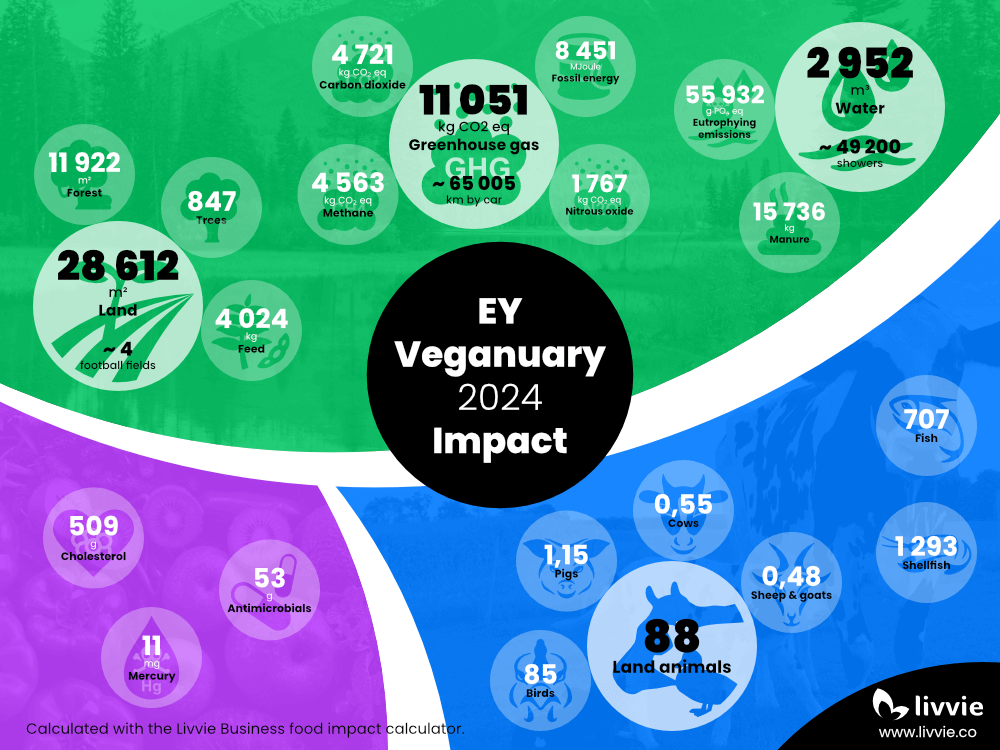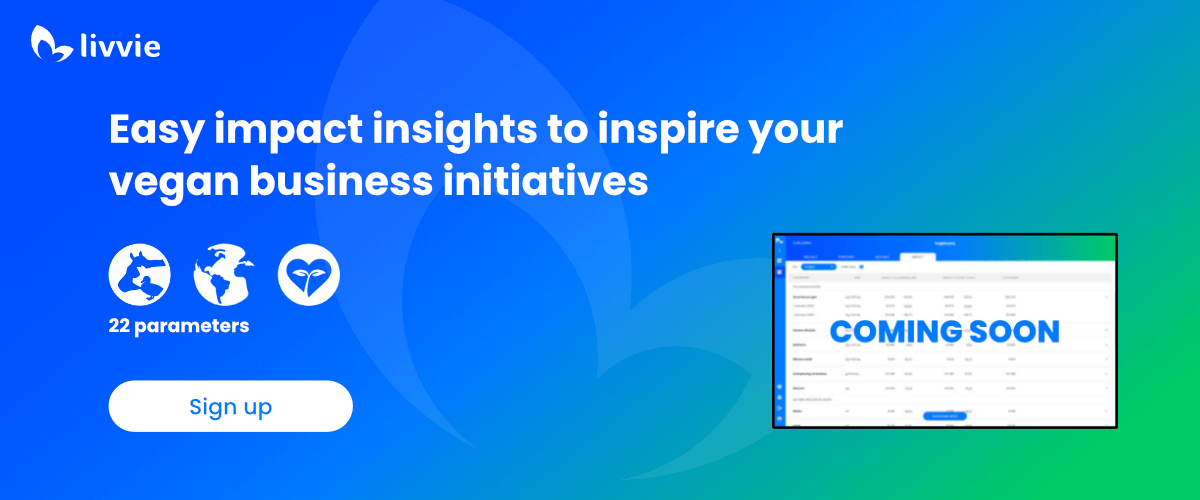EY’s Eco-Innovators Make a Sustainable Impact With Veganuary
Written by Johanna van Langen
Published 29 November 2024
Companies are increasingly held accountable for their sustainability efforts and promoting plant-based diets can contribute significantly. EY’s Eco-Innovators set an example of corporate responsibility for the environment by organising initiatives like Veganuary.
Implementing sustainability initiatives at work requires active engagement of employees. In this article, you’ll discover how the Eco-Innovators successfully encouraged Veganuary participation, motivated vegan food choices, and made a meaningful impact on the planet and society.

Calculate the impact of your Veganuary workplace challenge
EY’s Eco-Innovators Help the Planet With Sustainable Business Initiatives
Climate change is one of humanity’s biggest threats and both governments and customers demand companies to reduce their environmental footprint. EY demonstrates a strong commitment to corporate sustainability by extending their purpose of ‘Building a better working world’ to include environmental responsibility. Dedicated to protecting the planet, EY aims to achieve net zero carbon emissions by 2025 and inspire other companies to adopt green business practices.
“As one of the Big Four accounting firms, EY is in a privileged position to work with a variety of organisations, large and small. We hope to set an example and grow awareness about the importance of sustainability in business operations,” says Bobby Leaf, Manager UK&I Assurance at EY and Eco-Innovators Activism workstream leader.
The Eco-Innovators, a group of employees passionate about sustainability, embody EY’s mission. This network addresses major environmental issues like climate change, pollution, and biodiversity loss through innovative ideas in sustainable finance, fashion, energy, and food. Their initiatives aim to reduce EY’s operational footprint, support clients in managing environmental risks, and empower employees to make sustainable personal changes.
What began in 2019 with a few colleagues has now expanded into a global movement, with over 1,000 employees making a sustainable impact.
Encouraging Sustainable Diets With the Veganuary Workplace Challenge
Our food system is a significant contributor to climate change and other environmental issues. Transitioning towards plant-based diets is essential for a sustainable future. Businesses can support their Environmental, Social, and Governance (ESG) goals by encouraging employees to adopt vegetarian or vegan diets.
The Eco-Innovators recognised that food is an inclusive way to promote sustainability because everyone eats daily. Since 2020, they have organised an annual Veganuary Workplace Challenge for EY employees.

Veganuary challenges people to eat vegan for 31 days, inspiring millions to try veganism in January. The organisation supports companies like EY in hosting the Veganuary Workplace Challenge as an engaging employee initiative. January, a time for new beginnings, is perfect for encouraging plant-based eating, especially after the holiday season. For the Eco-Innovators, Veganuary is an excellent opportunity to engage employees and raise awareness about the positive impact of plant-based diets.
How the Eco-Innovators Organised a Successful Veganuary at EY
The main challenge in organising Veganuary successfully is motivating employees to participate and stay committed throughout the event. The Eco-Innovators implemented effective strategies to keep employees engaged and motivated to make sustainable food choices.
1. Stimulate Participation by Organising an Inclusive Initiative
2. Show Leadership Commitment by Endorsing and Joining Veganuary
3. Create a Supportive Veganuary Community to Drive Engagement
4. Reward Vegan Food Choices to Motivate Participants
1. Stimulate Participation by Organising an Inclusive Initiative
The goal of Veganuary at EY was to raise awareness about animal product consumption and educate employees on the benefits of plant-based diets. To maximise participation, it was crucial to make the challenge accessible to all employees. The Eco-Innovators realised that people have different perspectives and not everyone can or wants to eat completely vegan or vegetarian for 31 days.
They created a scale of conscious consumption, ranging from small to big steps towards a more vegan diet. Steps include replacing dairy with plant-based alternatives, ordering from vegan restaurants, and eating vegetarian or vegan for an entire day. By rewarding small food choices towards a vegan diet, Veganuary became an inclusive and accessible challenge for all employees.
“I want Veganuary participants to learn that anyone can try to eat more plant-based and that every small diet change is a positive step forward,” shares Bobby.

2. Show Leadership Commitment by Endorsing and Joining Veganuary
When organising a sustainability initiative, securing executive buy-in is essential for demonstrating its value to the business. It’s even more impactful when leaders actively participate and endorse the initiative.
The inclusive approach of the Eco-Innovators enabled many senior leaders at EY to take part, showcasing their personal commitment to sustainable changes. Their endorsement and participation in Veganuary generated substantial visibility and set a positive example, inspiring other employees to join.
“Employees always look at their leaders, and seeing them commit is really motivating,” Bobby emphasises.
Executive commitment also supports additional activities, such as collaborating with catering services to offer more plant-based options and encourage sustainable food choices.
3. Create a Supportive Veganuary Community to Drive Engagement
One of the biggest challenges is maintaining participant engagement and commitment throughout Veganuary. The Eco-Innovators addressed this by creating an interactive, supportive community for employees during the challenge.
Participants were assigned to diverse teams with colleagues from different countries and levels of seniority. This diversity allowed them to learn from various food cultures and experiences while connecting with each other personally.
Within these teams and the broader community, participants shared vegan recipes, advice, book and documentary recommendations, and engaged in friendly discussions about veganism. This sense of community helped participants feel part of something larger, reinforcing their commitment to the challenge.
4. Reward Vegan Food Choices to Motivate Participants
The Eco-Innovators found another effective way to motivate participants to make eco-friendly food choices by gamifying Veganuary. Each step towards a plant-based diet earned points, depending on the level of difficulty.
These points contributed to both individual and team scores, which were tracked on a leaderboard. The team structure played a crucial role in driving engagement by serving as an extrinsic motivator.
“Knowing that every ounce of energy you put into the challenge influences your team’s success instils accountability and helps you see it through,” Bobby points out.
The winners of this healthy competition were rewarded with an online plant-based cooking class, perfectly aligning with the Veganuary theme.
5. Grow Awareness With Educational Webinars about Veganism
The primary goal of Veganuary is to increase awareness about the benefits of a plant-based diet and inspire permanent dietary changes. Many people are hesitant to adopt vegetarian or vegan diets due to a lack of knowledge or scepticism. To address this, the Eco-Innovators organise several educational webinars each year during Veganuary.
These webinars feature external speakers who delve into scientific research on the benefits of a vegan diet, dispelling myths and stigmas. Other sessions cover vegan food trends, practical tips, and personal transition stories.
“Educating people makes them reflect on the lifestyle they take for granted and equips them to make changes that align with their beliefs,” Bobby says.
6. Highlight the Sustainable Impact of Veganuary
For EY’s Veganuary 2024, the Eco-Innovators partnered with Livvie to calculate the positive impact of the challenge. The impact data helped drive awareness and motivate participants and highlighted the contribution of the initiative to EY’s sustainability mission.
Calculating the positive impact of EY’s Veganuary
During Veganuary, participants tracked their vegan and vegetarian days as part of the point system. This data was analysed using the Livvie Business food impact calculator, assessing 22 different parameters.
The 110 participants from 12 countries averaged 4,2 vegetarian days and 7,5 vegan days in January. This collective effort made a meaningful impact on the planet and society. Together, they saved 28.612 m² of land (4 football fields), 2.952 m³ of water (49.000 showers), and 11.051 kg of greenhouse gas emissions (equivalent to 65.000 km by car). Additionally, they avoided 509 g of cholesterol intake and saved the lives of 88 land animals and 707 fish. An impressive contribution to EY’s sustainability mission and ESG goals.

Educating and motivating Veganuary participants with impact data
On January 31st, Livvie presented the impact results in a concluding webinar. The session began with an explanation of the environmental footprint of our food system and addressed psychological objections to veganism. This was followed by a presentation of the team’s positive impact through their plant-based food choices during Veganuary.
Deep-diving into the impact data proved to be an effective way to stimulate lively discussions about veganism. Participants were highly engaged, sharing questions, comments, and supporting answers and tips, demonstrating the community’s value.
To encourage dietary changes, it’s important to recognise that people have different motivations for their food choices. While EY and the Eco-Innovators are driven by sustainability, many individuals are motivated by health or animal welfare. Presenting impact insights on multiple parameters helps appeal to a broad audience based on their personal values.
Sharing the initiative’s impact made a profound impression, as participants realised the substantial effect of simple dietary changes on creating a better future. After the impact webinar, 97% of participants felt more motivated to continue eating more plant-based foods. So, presenting social impact data effectively supported both education and motivation during Veganuary.

Organising Veganuary at Work Supports Corporate Sustainability
EY’s Eco-Innovators have demonstrated how a well-organised Veganuary can enhance corporate sustainability efforts. By applying effective strategies, they have set a valuable example for encouraging employee participation and commitment.
Ensuring the challenge was inclusive and endorsed by leadership boosted participation. By rewarding sustainable food choices, creating a supportive community, and highlighting the positive impact, they inspired employee engagement and motivation.
If your business is looking for ways to contribute to environmental sustainability, promoting plant-based diets with initiatives like Veganuary can be a powerful strategy. Use the Livvie Business food impact calculator to understand the potential environmental impact of your vegan business initiative.

Share this article to inspire your colleagues and executives to organise Veganuary at your company.

